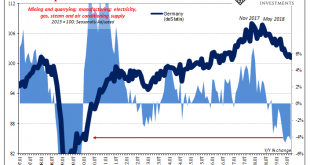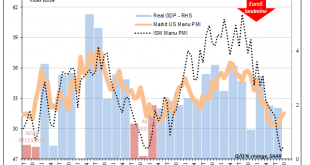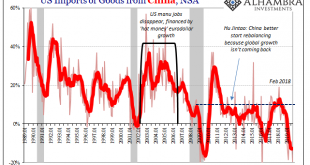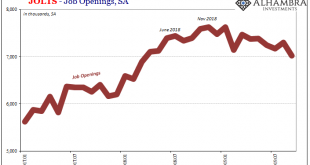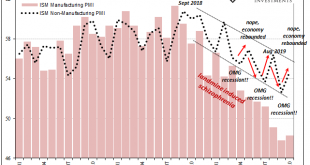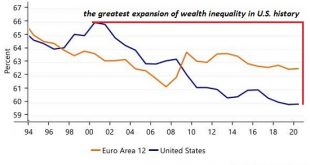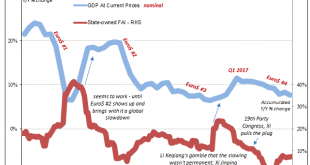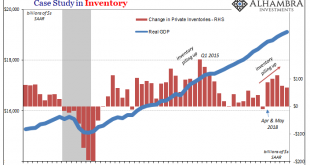Germany’s vast industrial sector continued in the tank in September. According to new estimates from deStatis, that country’s government agency responsible for maintaining economic data, Industrial Production dropped by another 4% year-over-year during the month of September 2019. It was the fifth consecutive monthly decline at around that alarming rate. Four percent doesn’t sound like much, but in the context of German IP it is well within recession territory....
Read More »Still Stuck In Between
Note: originally published Friday, Nov 1 There wasn’t much by way of the ISM’s Manufacturing PMI to allay fears of recession. Much like the payroll numbers, an uncolored analysis of them, anyway, there was far more bad than good. For the month of October 2019, the index rose slightly from September’s decade low. At 48.3, it was up just half a point last month from the month prior. Most of that was related to a curious surge in New Export Orders. Having dropped to...
Read More »The Sudden Need For A Trade Deal
Talk of trade deals is everywhere. Markets can’t get enough of it, even the here-to-fore pessimistic bond complex. Rates have backed up as a few whispers of BOND ROUT!!! reappear from their one-year slumber. If Trump broke the global economy, then his trade deal fixes it. There’s another way of looking at it, though. Why did the President go spoiling for trouble with China in 2018? I don’t mean to ask what his rationale was, more along the lines of, why 2018? Why...
Read More »From Friends to Nemeses: JO and Jay
It was one of the first major speeches of his tenure. Speaking to the Economic Club of Chicago in April 2018, newly crowned Federal Reserve Chairman Jerome Powell was full of optimism. At that time, however, optimism was being framed as some sort of bad thing. This was the height of inflation hysteria, where any sort of official upgrade to the economic condition was taken as further “hawkishness.” Things were so good, they said, the situation was in danger of...
Read More »You Have To Try Really Hard Not To See It
In early September, the Institute for Supply Management (ISM) released figures for its non-manufacturing PMI that calmed nervous markets. A few weeks before anyone would start talking about repo, repo operations, and not-QE asset purchases, recession and slowdown fears were already prevalent. It hadn’t been a very good summer to that end, the promised second half rebound failing to materialize being more and more replaced by central banker backpedaling here as well...
Read More »Dollar Rally Stalls as Fresh Drivers Awaited
US-China relations continue to improve with news of cooperation in a major fentanyl case Eurozone final services and composite PMIs surprised on the upside; UK Parliament will be dissolved today Poland is expected to keep rates steady at 1.5%; Russia October CPI is expected to rise 3.8% y/y China sold €4 bn in its first euro-denominated bond since 2004; Thailand cut rates 25 bp to 1.25%, as expected The dollar is mostly softer against the majors as its recent rally...
Read More »The Middle Class Is Now The Muddle Class
The net result is the muddle class has the signifiers but not the wealth, power, capital or agency that once defined the middle class. The first use of the phrase The Muddle Class appears to be The rise of the muddle classes (Becky Pugh, telegraph.co.uk) in January 2007. The “muddle” described the complex nature of defining “the middle class,” which includes education, class origins, accents, and many other financial, social and cultural signifiers. Comedian Jason...
Read More »EM Preview for the Week Ahead
EM should continue to benefit from the generalized improvement in the global backdrop. Trade tensions have eased whilst the risks of a hard Brexit have fallen, at least for now. Yet recent developments in some major EM countries underscores how important it is for investors to differentiate between the strong credits and the weak ones. For instance, South Africa, Hong Kong, Argentina, and Chile all come with idiosyncratic risks. AMERICAS Chile reports September GDP...
Read More »More Synchronized, More Downturn, Still Global
China was the world economy’s best hope in 2017. Like it was the only realistic chance to push out of the post-2008 doldrums, a malaise that has grown increasingly spasmatic and dangerous the longer it goes on. Communist authorities, some of them, anyway, reacted to Euro$ #3’s fallout early on in 2016 by dusting off their Keynes. A stimulus panic that turned out to be more panic than stimulus. China GDP, 2007-2019(see more posts on China Gross Domestic Product, )...
Read More »The Inventory Context For Rate Cuts and Their Real Nature/Purpose
What typically distinguishes recessions from downturns is the inventory cycle. Even in 2008, that was the basis for the Great “Recession.” It was distinguished most prominently by the financial conditions and global-reaching panic, true, but the effects of the monetary crash registered heaviest in the various parts of that inventory process. An economy for whatever reasons slows down. That leads to inventory piling up across the various levels of the supply chain....
Read More » Swiss Economicblogs.org
Swiss Economicblogs.org

